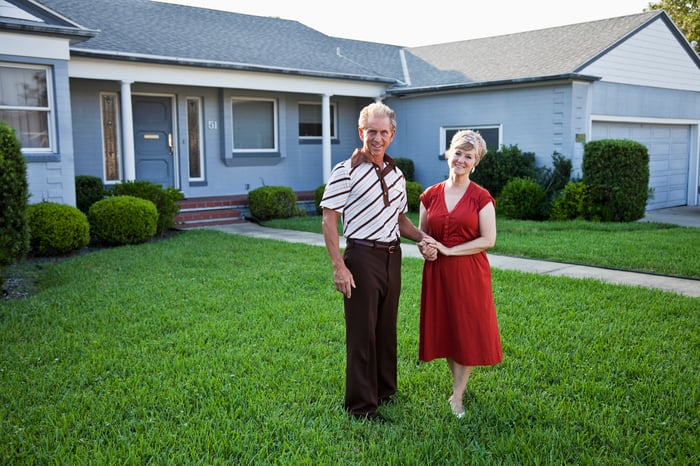Ask the average working American what his or her largest monthly expense is, and you'll most likely hear that the answer in housing. Now the good news is that retirees spend less than workers, on average, to put a roof over their heads. The bad is that they're still forced to spend a lot.
The average retiree spends $16,723 per year on housing. That figure includes rent or mortgage payments, insurance, and, if applicable, property taxes, maintenance, and repairs. It doesn't include utilities like heat, electricity, and water, nor does it include household amenities like cable and internet service.

IMAGE SOURCE: GETTY IMAGES.
Given that the average Social Security beneficiary collects just $17,532 a year, that's a lot of money. Of course, seniors living on Social Security alone probably aren't spending $16,723 on their homes. But still, many retirees do end up getting caught off-guard when they realize just how expensive housing is.
If you're not yet retired, make sure you're aware of what housing might cost you during your golden years. And if you're already retired and are struggling to keep up with your housing costs, a few lifestyle changes might be in order.
Don't let housing monopolize your retirement income
Seniors have no choice but to pay for housing -- they need to live somewhere. But if housing is currently eating up an uncomfortably large chunk of your retirement income, then it's time to consider adjusting your living situation.
First, if you currently own a home, you might look at downsizing to a smaller one, or renting instead. The benefit of renting in retirement is that you'll lock in your monthly housing costs for the duration of whatever lease you sign. And while you will lose out on the tax benefits of homeownership, like deducting mortgage interest and property taxes, you'll also shed the financial burden of upkeep, which, in some cases, could be more expensive than a mortgage payment itself.
If you're already a renter in retirement, having less space could lower your monthly rent payments, thereby freeing up money for other purposes. Similarly, moving to a less popular or convenient neighborhood could have the same effect, though you'll need to weigh the drawbacks and costs of being further away from shops and amenities against the savings at play.
Now if you're not yet retired, but are thinking your housing costs will drop drastically once your career comes to a close, think again. Even if you're a homeowner who manages to become mortgage-free in time for retirement, you'll still likely have rising housing expenses to contend with. That's because as homes age, issues with them tend to creep up. And those issues could cost you a lot of money -- money you can't afford to spend as a senior. Property taxes also have a tendency to rise over time, even during periods when home values drop. Therefore, the savings you reap by shedding your mortgage payment could be mostly, or completely, offset by new home expenses.
This isn't to say that you must rush to sell your home before retiring. Rather, be realistic about the costs you'll incur by hanging onto it, and budget for them appropriately.
Remember, too, that while some of your living expenses might go down in retirement, others, like healthcare, are more likely than not to climb. If housing takes up too much of your income, you might really struggle to keep up with the rest of your bills, and that's not a scenario you want. Therefore, be mindful of your housing costs in retirement, and if they're too high for comfort, find a way to reduce them one way or another.




